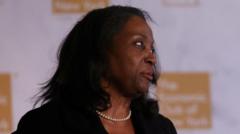What’s Next for the Fed Governor Trump Attempted to Fire?

Published: 2025-08-29 17:28:04 | Category: wales
This article explores the recent emergency court hearing concerning President Donald Trump's attempt to remove Federal Reserve governor Lisa Cook from her position. Cook's legal team is challenging the president's authority, asserting that the move is unlawful. The outcome of this case could have significant implications for the independence of the US central bank.
Last updated: 26 October 2023 (BST)
Key Takeaways
- President Trump is attempting to remove Federal Reserve governor Lisa Cook.
- Cook's lawyers filed for a temporary restraining order against the president's actions.
- The case hinges on the definition of "cause" for removal under the Federal Reserve Act.
- Accusations against Cook involve alleged falsification of mortgage documents.
- The legal battle could escalate to the Supreme Court, impacting the Fed's independence.
The Context of the Case
The case stems from President Trump's assertion that he has "sufficient reason" to believe that Lisa Cook made false statements regarding her mortgage. This claim comes amidst Trump's growing criticism of the Federal Reserve's monetary policy, particularly its reluctance to lower interest rates. The president argues that his constitutional powers allow him to remove Cook from her position, but the legality of this action is being contested in court.
The Legal Arguments
Cook's Position
Cook's legal counsel, Abbe Lowell, has made a strong case for maintaining her position during the legal proceedings. He argues that removing her would disrupt the status quo and hinder her ability to perform her duties. Lowell emphasised that Cook should have access to her work tools and continue her responsibilities, as she did prior to the controversy.
The Justice Department's Stance
On the other hand, Yaakov Roth, a key attorney from the Justice Department, contended that there are adequate grounds for Cook's dismissal. He posited that the president's desire to remove her is not primarily motivated by a wish to exert more control over the Federal Reserve. Rather, Roth suggested that Cook's conduct could be seen as a valid reason for her removal, especially if it is proven that she made contradictory statements regarding her financial disclosures.
Understanding "Cause" for Removal
The Federal Reserve Act stipulates that the president can only remove a Federal Reserve official for "cause." The definition of "cause" is central to this case. Roth clarified that "cause" cannot simply be a difference in policy opinions; it must relate to an individual's competency and integrity in their role.
In this regard, Cook's alleged mortgage discrepancies come under scrutiny. Accusations have surfaced claiming that Cook signed two documents asserting that homes in different states were her primary residence. While no formal charges have been filed against her, the implications of these allegations could significantly influence the court's decision on the president's authority to remove her.
The Implications of the Case
The potential ramifications of this case are considerable. If the court rules in favour of Cook, it could reinforce the independence of the Federal Reserve from political influence, a principle that has been a cornerstone of US economic policy. Conversely, a ruling in favour of the president may set a precedent that could undermine the autonomy of central bank officials in the future.
Potential Supreme Court Involvement
Legal experts suggest that this case could escalate to the Supreme Court, given its constitutional implications. The outcome could redefine the powers of the presidency concerning federal appointees, particularly those in significant regulatory positions like the Federal Reserve. The high court’s involvement would not only settle this matter but could also influence future interactions between the executive branch and independent regulatory agencies.
What Happens Next?
The court has yet to issue a ruling on the temporary restraining order requested by Cook's lawyers. As the legal proceedings unfold, both parties will continue to prepare their arguments, and the case will likely attract significant media attention and public interest. Given the political climate and ongoing tensions surrounding monetary policy, the developments of this case will be closely monitored by economists, policymakers, and the general public alike.
Conclusion
As the legal battle over Lisa Cook's position unfolds, the implications for the Federal Reserve's independence and the broader context of presidential powers remain critical. The outcome of this case could reshape the landscape of US monetary policy and the relationship between the executive branch and central bank officials. How this situation resolves may have lasting effects on governance and financial regulation in the United States.
What do you think will be the long-term impact of this case on the Federal Reserve's authority? #FederalReserve #Trump #LegalBattle
FAQs
What is the basis for Trump's attempt to remove Lisa Cook?
President Trump claims there is "sufficient reason" to believe that Cook made false statements regarding her mortgage, which he cites as grounds for her removal under the Federal Reserve Act.
What does the Federal Reserve Act say about removing officials?
The Federal Reserve Act allows the president to remove officials only "for cause," which must relate to their ability to perform their job and not simply be based on policy disagreements.
Could this case go to the Supreme Court?
Yes, legal experts suggest that the case could escalate to the Supreme Court due to its constitutional implications regarding presidential powers over federal appointees.
What are the accusations against Lisa Cook?
Cook has been accused of signing two contradictory documents regarding her primary residence on mortgage applications, though no formal charges have been filed against her.
Why is the independence of the Federal Reserve important?
The independence of the Federal Reserve is crucial as it allows the central bank to make decisions based on economic indicators without political pressure, promoting stable economic growth.



